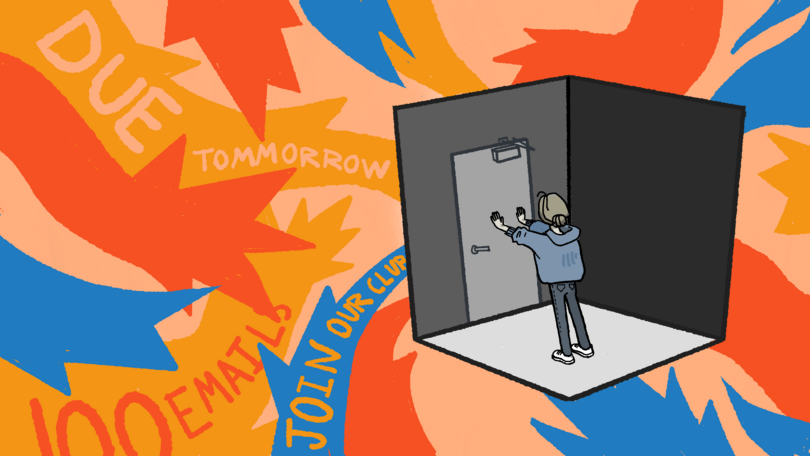Personal Essay: My struggle with overstimulation, avoidance during senior year

With the constant stimulation in society, our essayist understands being engulfed with a million different tasks. She sympathizes with students who feel overwhelmed, prompting them to appreciate downtime rather than feeling guilty. Julia Rodenberger | Contributing Illustrator
Get the latest Syracuse news delivered right to your inbox.
Subscribe to our newsletter here.
Writing has been my biggest outlet, both emotionally and creatively, for the majority of my life. As life sped up and changed around me, being able to get words on a page always grounded me. Now, I find myself struggling to bring myself to write anything. The shift has been jarring to say the least.
Recently, my brain feels like it has short-circuited. It looms larger and far more painfully than writer’s block – it’s a genuine systemic error where it feels like my head is just an empty void. Defining it that way seems dramatic, but I can’t shake this constant burden of such intense executive dysfunction.
It’s almost like a paradox: I feel both overstimulated and understimulated at the same time.
Part of me feels like there’s genuinely nothing for me to do, and I spend all of my free time doomscrolling and occupying myself with YouTube videos and random tasks. The other half of me knows that I’m drowning in busy to-do lists and pressing work. I’m fully aware I should be pouring energy into those tasks.
But knowing how much I have to get done, I stress myself out, and avoid it all like the plague instead. Maybe it’s because part of me knows that sitting down and conquering the mountainous list of tasks makes it real, and it confirms that the only way to escape the constant drowning in work is to swim. So, in avoiding that harsh reality, I do anything and everything else, specifically meaningless things that don’t accomplish anything at all.
Unsurprisingly, I faced this exact problem when sitting down to write this essay. I opened up my computer, wrote about three sentences, and then felt my brain going in all different directions of where to take this piece.
Instead of sifting through the ideas and writing them out, the overwhelming feeling of having to make a choice washed over me. I felt frozen, like I was paralyzed by a simple assignment. I physically couldn’t bring myself to do the very task I was meant to be doing, and I realized it wasn’t the first time I’d felt this way. The cycle still persisted, though, and I began to make excuses for myself.
It's frustrating that something supposedly universal can feel so intensely isolating.Gracie Lebersfeld, Essayist
Three sentences in, I remembered that there were still dishes in the sink from last night – obviously, I couldn’t work on this essay when there were dishes in the sink. So I told myself I’d finish just after I washed the dishes.
Then I also remembered that my laundry needs to get done, and I definitely couldn’t write with a pile of dirty laundry sitting on my floor.
This is what my work ethic looks like each time I have an assignment, up to the very moment the deadline is in my face. I swear to myself I won’t leave things until the last minute ever again, and break that promise as soon as a new task is presented.
This cyclical struggle isn’t limited to my current schoolwork and other academic demands – I also see it seeping into the process of planning post-grad. I know I should dedicate the little free time I have to scouring LinkedIn for job opportunities and reaching out to potential employers, but instead, I spend that time reorganizing my desk drawers and arranging all of my sweaters in rainbow order.
It’s frustrating that something supposedly universal can feel so intensely isolating.
In full transparency, I don’t see this issue subsiding. Executive dysfunction will most likely continue to affect me for the foreseeable future, especially with my college career wrapping up soon. As that final day nears, I’m trying to remind myself what a privilege it is to have so much to do. It’s a great thing to be inundated with tasks and obligations, especially when they excite you.
But amid all of the chaos, I’m also trying to remind myself that sometimes it’s OK to just let yourself be. It’s OK to stop, genuinely appreciate the downtime and treat it as such.
This time in our lives as students is such an intense whirlwind of emotion and work, and there’s no shame in taking advantage of the brief blips in the rollercoaster. Genuinely enjoy those moments because downtime drenched in guilt isn’t really downtime at all.
Do nothing, and if you’re going to do something, make it something you usually wouldn’t have time to do. Preparing for the future is important, but learning how to take back control over the ebbs within the flow is just as crucial.
Gracie Lebersfeld is a senior majoring in selected studies in education and creative writing. She can be reached at gmlebers@syr.edu






